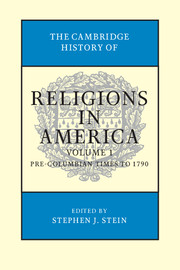Book contents
- Frontmatter
- Contents
- Contributors
- Editor's Introduction
- SECTION I BACKGROUND ON RELIGIOUS TRADITIONS – PRE-1500S
- SECTION II RELIGIONS IN THE POST-COLUMBIAN NEW WORLD – 1500–1680S
- SECTION III RELIGIOUS PATTERNS IN COLONIAL AMERICA – 1680S–1730S
- SECTION IV RELIGIOUS DIVERSITY IN BRITISH AMERICA – 1730S–1790
- SECTION V AMERICAN RELIGIONS IN THE EIGHTEENTH-CENTURY INTERNATIONAL CONTEXT
- 26 Religion and Imperial Conflict
- 27 Evangelical Awakenings in the Atlantic Community
- 28 Religion and the American Revolution
- 29 The Religious Landscape: From the Revolution to the New Nation
- 30 Religion in Canada, 1759–1815
- 31 From Religious Nationalism to Political Consciousness: The Bourbon Reforms in Spanish America, 1750–1790
- SECTION VI THEMATIC ESSAYS
- Index
- References
30 - Religion in Canada, 1759–1815
from SECTION V - AMERICAN RELIGIONS IN THE EIGHTEENTH-CENTURY INTERNATIONAL CONTEXT
Published online by Cambridge University Press: 28 July 2012
- Frontmatter
- Contents
- Contributors
- Editor's Introduction
- SECTION I BACKGROUND ON RELIGIOUS TRADITIONS – PRE-1500S
- SECTION II RELIGIONS IN THE POST-COLUMBIAN NEW WORLD – 1500–1680S
- SECTION III RELIGIOUS PATTERNS IN COLONIAL AMERICA – 1680S–1730S
- SECTION IV RELIGIOUS DIVERSITY IN BRITISH AMERICA – 1730S–1790
- SECTION V AMERICAN RELIGIONS IN THE EIGHTEENTH-CENTURY INTERNATIONAL CONTEXT
- 26 Religion and Imperial Conflict
- 27 Evangelical Awakenings in the Atlantic Community
- 28 Religion and the American Revolution
- 29 The Religious Landscape: From the Revolution to the New Nation
- 30 Religion in Canada, 1759–1815
- 31 From Religious Nationalism to Political Consciousness: The Bourbon Reforms in Spanish America, 1750–1790
- SECTION VI THEMATIC ESSAYS
- Index
- References
Summary
The history of British North America from 1759 to 1815 set Canada on a religious course that would differ significantly from what transpired in the United States. To be sure, much in early Canadian religious history is familiar to Americans because of circumstances, heritages, and events shared by all North Americans. These common experiences included historic tensions between Roman Catholics and Protestants, a large measure of Protestant pluralism, the presence of evangelical revival, consistent disregard of native religion, internal conflict over the wisdom of revolution, strong commitment to liberty, full exposure to Enlightenment thinking, and deep divisions created by ethnicity or race. Yet because of the distinctive unfolding of Canadian history, religion in Canada has never simply replicated American experience.
The kind of national comparison offered by Seymour Martin Lipset describes much that has been distinctive in religion as in other spheres. In Lipset's account, Canadian society “has been and is a more class-aware, elitist, law-abiding, statist, collectivity-oriented, and particularistic (group-oriented) society than the United States.” The antistatism, individualism, populism, violence, and egalitarianism that have often characterized American history have been decidedly less prominent in Canada. Some explanations for these systematic differences are geographical. Canada's vast space and sparse population have required a more active government and have placed a premium on cooperation in the churches. But an even broader explanation is historical.
- Type
- Chapter
- Information
- The Cambridge History of Religions in America , pp. 610 - 633Publisher: Cambridge University PressPrint publication year: 2000



